#The Cruz Brothers and Miss Malloy
Explore tagged Tumblr posts
Text
Seen in ’23: Annual Roundup

Top new-to-me films of ‘23
(in the order I saw them, not preference)
The Blizzard / Gunnar Hedes saga (1923) [imdb | letterboxd]
The Rafter’s Bride / Koskenlaskijan morsian (1923) [imdb | letterboxd]
Funeral Parade of Roses / 薔薇の葬列 (1969) [letterboxd | imdb]
Dorian Gray in the Mirror of the Yellow Press / Dorian Gray im Spiegel der Boulevardpresse (1984) [letterboxd | imdb]
Drylongso (1998) [letterboxd | imdb]
The Cruz Brothers and Miss Malloy (1980) [letterboxd | imdb]
The Burning Crucible / Le Brasier ardent (1923) [letterboxd | imdb]
Let’s Scare Jessica to Death (1971) [letterboxd | imdb]
Merry-Go-Round (1923) [letterboxd | imdb]
Dream Demon (1988) [letterboxd | imdb]
Mazel Tov / Ost und West (1923) [letterboxd | imdb]
The Signal Tower (1924) [letterboxd | imdb]
The Second Track / Das zweite Gleis (1962) [letterboxd | imdb]
Restless Blood / Levoton Veri (1946) [letterboxd | imdb]
The Man Without Desire (1923) [letterboxd | imdb]
Revolutionary Girl Utena: The Adolescence of Utena / 少女革命ウテナ アドゥレセンス黙示録 (1999) [letterboxd | imdb]
---
Honorable mention:
Ritratto di donna velata (1972) [letterboxd | imdb] (because it’s technically a mini-series)
Spirits of the Dead / Histoires extraordinaires (1968) [letterboxd | imdb] (because it would make the year-end list for “Toby Dammit” alone TBH)
So, according to letterboxd, only 33% of the films I watched in 2023 were rewatches. In an unexpected bit of consistency, that’s also my proportion of rewatches for ‘22 and ‘21. Sometimes crunching the numbers teaches you potentially meaningless things about yourself.
On my letterboxd, I put together a list of my top new-to-me films of ’23, in case you want an easier way to check if there’s anything you might want to add to your own watchlists!
READ ON BELOW THE JUMP!
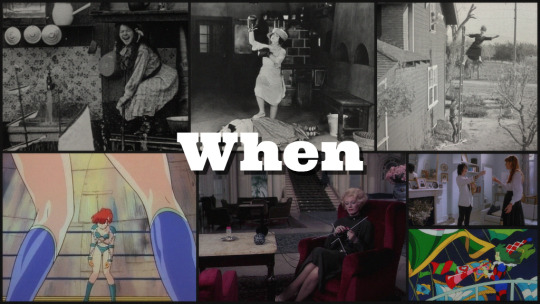
As I continued my tradition of watching films as they turn 100, the 1920s was my most-watched decade as it was in 2022.
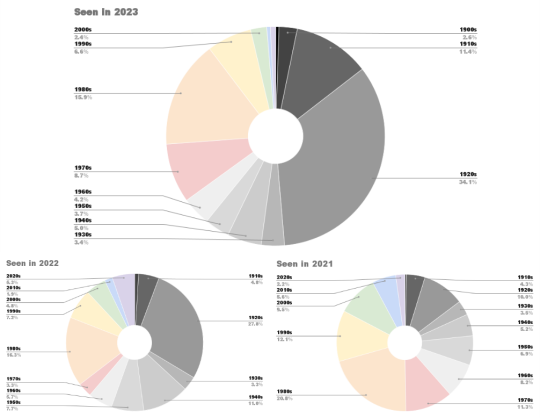
I was startled looking at the stats that the 1930s were so underrepresented! To ward that off in 2024, I think I’ll binge some pre-codes. Maybe we should all watch pre-codes in March 2024 to dishonor Will Hays on his birthday?
My top individual years were:
1923
1987
1986
1920
1911
1971 (unexpected!)
1988
---

In another bit of unexpected consistency, I seem to have watched roughly 60% American-made films every year for the last 3 years?

Regardless, I think my MVP for this year was Finland. Teuvo Tulio is quickly becoming one of my favorite directors and the silent films from Finland that I watched this year were highlights too!
---

My most watched actors for 2023 were:
Alice Howell
James Finlayson
Stan Laurel
Snub Pollard
Katherine Grant
Marie Mosquini
Christopher Lee
Jackie Cooper
Lois Weber
Mabel Normand
Noah Young
Oliver Hardy
Richard Smith
Can you tell that I watched a ton of silent comedy in 2023? Of course Marie and Snub are making a return appearance here from last year, so I suppose I watched plenty of comedy shorts in ‘22 as well.
If you were only to count the feature films that I watched, Christopher Lee, Boris Karloff, Douglas Fairbanks, Vincent Price, and William Haines would top the list!
---

My most watched directors were:
Alice Guy
Dave Fleischer
George Jeske
Arthur Rankin Jr. & Jules Bass
Charley Chase
John G. Blystone
Lois Weber
Richard Smith
Maya Deren
Phillips Smalley
Another affirmation that I watched a whole lot of silent shorts, but this time because of the fantastic Pioneers: First Women Filmmakers set. I highly recommend picking up a copy (or checking it out of your local library). Not only is the set well curated, but there are so many great extras to put the films in context.
For Christmas ‘23, I got the Cinema’s First Nasty Women set and I’m very excited to marathon those and be influenced into a year of behaving badly.
Maya Deren makes the list because I re-watched her films in advance of my cosplay/profile of her. If you haven’t dug into Deren’s short but fascinating filmography yet, I highly recommend it!
#roundup#year end roundup#film recommendation#movie recommendations#film blog#film#classic film#classic movies#silent film#silent movies#silent cinema#cinema#filmblr#movies#world cinema#animation
8 notes
·
View notes
Photo




The Cruz Brothers and Miss Malloy, 1980 (dir. Kathleen Collins)
#The Cruz Brothers and Miss Malloy#Kathleen Collins#Jose Machado#Sylvia Field#Lionel Pina#Randy Ruiz#52 Films By Women#Directed By Women
42 notes
·
View notes
Photo



The Cruz Brothers and Miss Malloy | dir. Kathleen Collins (1980)
14 notes
·
View notes
Photo










Every day of Black History Month and Women’s History Month, we will be highlighting over 50 superb films by black women directors from different countries, eras, and industries. This is a new collection of essential screen achievements by noted masters, exciting newcomers, and underappreciated talents. Here are the first 10 selections:
Alma’s Rainbow (Ayoka Chenzira, 1994): A fractious matriarchy of fiercely independent Brooklynites — including a buttoned-up beautician, her bohemian sister, and her starry-eyed daughter — takes precedence in this comedy where each interaction crackles and every character shines.
Belle (Amma Asante, 2013): Asante sheds light on a peculiar historical case, puncturing the British aristocracy’s cold and sumptuous veneer with the hard-edged nuances of racial and gender inequity. As the heroine, Gugu Mbatha-Raw illumines a defiant spirit with prismatic purity.
Beyond the Lights (Gina Prince-Bythewood, 2014): A deeply-felt, perfectly-acted romantic and maternal melodrama that restores the genre to its rightful place in American film. Here, love is a meeting of two world-weary souls and a path to discerning �� and defending — one’s worth.
Chisholm ‘72: Unbought & Unbossed (Shola Lynch, 2004): With a wealth of archival footage and clearsighted interviews, Lynch draws back the curtain on our electoral system and pays effervescent tribute to Shirley Chisholm, who dreamt the impossible dream and dared to make it real.
Commandment Keeper Church, Beaufort South Carolina, May 1940 (Zora Neale Hurston, 1940): Count ethnographic filmmaker among the many careers Hurston held during her groundbreaking life. Here, she films Gullah worshipers and sermonizers with a style both engaged and engaging, ensuring that time will not erase them.
The Cruz Brothers and Miss Malloy (Kathleen Collins, 1980): Before Losing Ground, Collins set her sights on this tale of three Nuyorican orphans whose path crosses with a dying widow’s. A magical and mysterious film that touches gently, like the breeze brushing the tops of trees.
Cycles (Zeinabu irene Davis, 1989): Davis mixes media, draws on Yoruba traditions, and blurs the real and the imagined in this triumph of ecstatic experimentation, centered around a woman who rigorously purifies her home and body in the hopes of bringing about her overdue period.
Daughters of the Dust (Julie Dash, 1991): A lost world unearthed, its faces and places made present in a film so full of wisdom, splendor, and feeling that it eradicates the flatness of the screen. Dash created a landmark but also a sublime dream of what cinema can and should be.
Down in the Delta (Maya Angelou, 1998): Alfre Woodard is funny, flinty, and full-hearted as a single mom and struggling addict starting anew with estranged Mississippi kin. In Angelou’s only film, life is a forward march and family a time-honored bond both fragile and fortifying.
A Dream is What You Wake Up From (Carolyn Y. Johnson, 1978): Even as this incisive docudrama confounds the border between reality and fiction, its ideas about gender imbalance and the societal prejudice that locks black families outside of the American dream remain crystal-clear.
Written by Matthew Eng
#Black History Month#Film#A Dream is What You Wake Up From#Tribeca#Down in the Delta#Film Stills#Daughters of the Dust#Film History#Cycles#The Cruz Brothers and Miss Malloy#Commandment Keeper Church#Chisholm '72: Unbought & Unbossed#Beyond the Lights#Belle#Alma's Rainbow#Carolyn Y. Johnson#Maya Angelou#Julie Dash#Zeinabu irene Davis#Kathleen Collins#Zora Neale Hurston#Shola Lynch#Gina Prince-Bythewood#Amma Asante#Women's History Month#Ayoka Chenzira#Documentary#Alfre Woodard
165 notes
·
View notes
Text
february 2021 watchlist
going my home (2012, dir. hirokazu kore-eda)* the wind (1982, dir. souleymane cissé) girlfriends (1978, dir. claudia weill) soleil ô (1970, dir. med hondo) linda linda linda (2005, dir. nobuhiro yamashita) the cruz brothers and miss malloy (1980, dir. kathleen collins) tokyo twilight (1957, dir. yasujiro ozu) mirt sost shi amit (1976, dir. haile gerima) the rocking horsemen (1992, dir. nobuhiko obayashi) sweetgrass (2009, dir. lucien castaing-taylor & ilisa barbash)* zegen (1987, dir. shohei imamura) killer of sheep (1978, dir. charles burnett) the woman who ran (2020, dir. hong sang-soo) cane river (1982, dir. horace jenkins) oxhide (2005, dir. liu jiayin) losing ground (1982, dir. kathleen collins) oxhide ii (2009, dir. liu jiayin)* personal problems (1980, dir. bill gunn)* when the tenth month comes (1984, dir. đặng nhật minh) rouch in reverse (1995, dir. manthia diawara) song lang (2018, dir. leon lê)*
---
*it was neat to see kore-eda do a tv drama. going my home was pleasant and nicely nuanced as one might expect from him. im too tense when i watch movies and the goal this month was to try to relax more as i would with tv shows.
*i first heard of sweetgrass from my high school english teacher and now ive finally watched it ten years later. the subject matter isn’t always pleasant but stylistically this is the sort of thing i enjoy; it’s so relaxing when a movie doesn’t have a plot.
*my personal favorite movie this month was oxhide ii. again, bc it’s long takes and the plot is sparse. subtle, and all the more affecting for it. is the pleasure of the long take the pleasure of existence? is it the frame that wrings pleasure from the mundane?
*really enjoyed personal problems. nice and slow... lmao. and experimental. as a soap opera there’s closure to its arcs but at the same time it genuinely feels like it could go on forever.
*i hate watching viet movies bc they make me feel all the corny diaspora emotions, like mangos and monsoons or w/e lol. anyways, song lang was alright. (if you’re interested in it for romance you should be aware it’s a tragedy.) as a film it was pretty and as a story there’s quite a bit to chew on. but ultimately i found it overly written.
33 notes
·
View notes
Photo

A dusty, old house and a ghost populate this edition of Weekend Watching, but it’s not your typical ghost story.
~
The Cruz Brothers and Miss Malloy (Kathleen Collins, 1979)
The Cruz Brothers and Miss Malloy was adapted from a series of Henry H. Roth short stories by director Kathleen Collins. The brisk, 49-minute film takes place in Rockland County, just outside New York City, and follows the three Cruz brothers, whose father died in a failed bank robbery. The father’s ghost however constantly follows them around town and can communicate with Victor, the eldest son. In the course of their meandering adventures, they run into Miss Malloy, an old widow in the neighborhood who hires them to restore her mansion in preparation for one last grand party.
The presence of Poppa's ghost comes in and out of the story at various times throughout the film, but Collins's floating camera always implies his presence and it's here we get the sense that this is a story of clinging to a world that may be forgotten. It is somewhat rare to see a film featuring Latinos during this era, in this part of the country, not set somewhere like the Bronx or another inner city. Sure, the house they're renting is decrepit, but even as Jose says, just to get the suburbs of the city feels like they've made it.
On one hand, Victor is always looking forward, compelling his brothers to get their act together to try to pay the rent and keep what's left of their family going. Yet he's pulled back by the presence of Poppa's ghost, embodying the previous generation's insistence on acting the way they would have. Moreover, Victor is constantly cataloging his and his brother's lives on a tape recorder, documenting their experiences for posterity.
But the brothers' lament for a past that won't come back is dwarfed by Miss Malloy's dogged pursuit of recreating it. That past too is out of reach, a fool's errand that will eventually run out of time. In her heart of hearts, it seems she knows it, but it tethers her to the world. In a way it tethers her to the brothers as well. She senses a kinship with them. With the youngest brother Jose in particular, her past points a way forward for his future, if maybe only for a fleeting moment.
The passing of the torch doesn't just go from Poppa to his boys, it goes from Miss Malloy to the boys as well, alluding to the broader cultural changes the area was taking--something Victor himself mentions earlier in the film. "Father Time is undefeated" is a familiar saying in sports circles when talking about aging athletes and the film seems to suggest that accepting that fact allows us all to move on when we could just as easily be stuck. Or as Miss Malloy puts it, "Death is terrible when one cannot remember having lived."
The Cruz Brothers and Miss Malloy (1979) is available through Alexander Street Press.
2 notes
·
View notes
Link
December 10: The link above leads to Portuguese-language information about the 11th edition of the Mutual Films Session, and the first to be realized online, once again hosted and sponsored by the Instituto Moreira Salles.
An observer could argue that it is the event’s 12th edition, as the screenings planned for March of 2020 (consisting of a double-bill of On the Bowery and Une simple histoire) were canceled the week before their scheduled dates. As was the case for so many cultural spaces around the world this year, COVID-19 brought the Instituto’s activities to a hard and sudden close, forcing doors shut on art exhibitions, panel talks, and other live events together with film screenings. Though museums and cultural centers have largely reopened in Brazil during the past months, they have continued to operate with severe restrictions. The state of film exhibition here has essentially not changed since my comments last month on this blog on the matter, and it includes the decision by IMS’s Cinema department not to reopen the Instituto’s theaters in São Paulo and in Rio de Janeiro before next year.
Mariana Shellard and I have chosen to respond to the current moment with an online event consisting of two programs of short and medium-length films, with each program lasting under an hour. The films will be made available through IMS’s Vimeo account from December 11th to 17th, with free entry for each program’s first five thousand viewers (promo code MUTUAL) and access restricted to the Brazilian territory. Program 1 is a jazz-and-movement-themed outing consisting of George T. Nierenberg’s About Tap, Shirley Clarke’s Bridges-Go-Round (the version with Teo Macero’s jazz score, rather than the one with Bebe and Louis Barron’s electronic music score), and Charles Burnett’s When It Rains. Program 2 offers a pairing of equally musical and emotionally moving, singular works – Kathleen Collins’s The Cruz Brothers and Miss Malloy and Ronald K. Gray’s Transmagnifican Dambamuality. The Mutual Films website additionally counts with short new video interviews with Burnett and Nierenberg about their films, as well as brief video introductions by the daughters of the late Clarke and Collins.
We believe that Nierenberg, Clarke, and Burnett are among the most vital artists that the American cinema has ever produced, and that they deserve to be better known and to have been able to create more regularly. We also believe that Collins and Gray, whose directorial filmographies consist of three extant films in total, could have been essential figures in film history if they had been able to direct more work. As things stand, we are blessed for what we have.
The five films are all productions from the United States, realized on small budgets and with independent spirits. They also all pertain to the same distributor, Milestone Films, whose commitment to bringing little-known or forgotten films and artists into circulation (and consistently doing so in screening copies of sterling quality) has distinguished the company for over 30 years. At a time when different factors have rocked the industry of cinema into transformation, the passion of individuals to push humanist, small-scale cinema into the world remains an empowering historical constant. We expect for that passion to continue to survive and to find its way forcefully through changing times.
0 notes
Photo


Kathleen Collins, The Cruz Brothers and Miss Malloy (1980)
4 notes
·
View notes
Photo
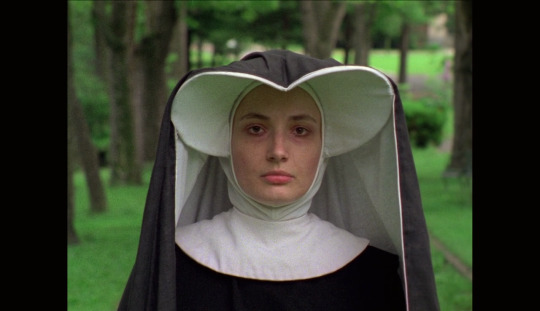
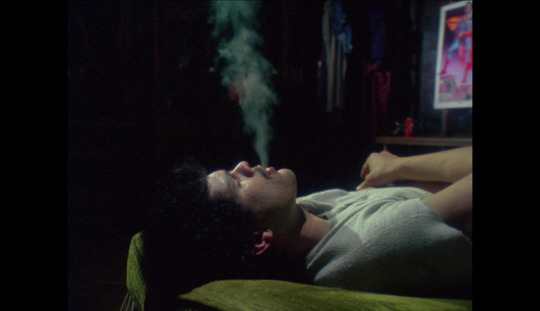
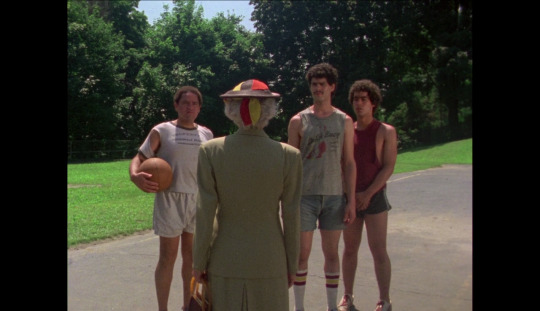

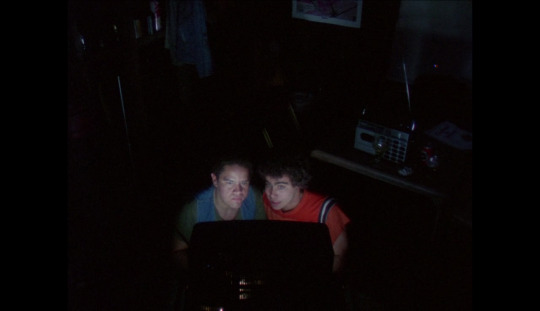

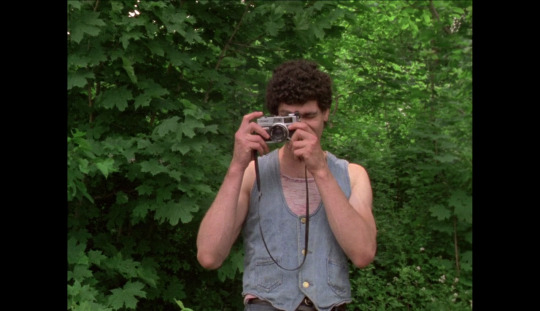

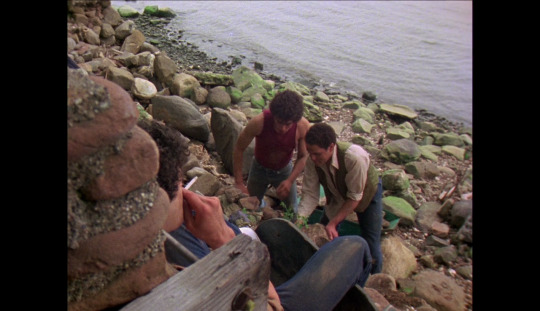

The Cruz Brothers and Miss Malloy (Kathleen Collins, 1980)
#films watched in 2023#The Cruz Brothers and Miss Malloy#seis#1980#Kathleen Collins#Rae Ferguson#Sylvia Field#Cesar Gonzalez#Ernesto Gonzalez#camera#smoke#back#long shot#windows#drama#death#nun#religion#ghost#ghosts
123 notes
·
View notes
Photo

The Cruz Brothers and Miss Malloy | Kathleen Collins | 1980
54 notes
·
View notes
Text

Favorite New-to-Me Films
June 2023
(in order of collage above R to L)
Fast Life (1932) [letterboxd | imdb]
The Shock (1923) [letterboxd | imdb]
Maison Ikkoku: The Final Chapter (1988) [letterboxd | imdb]
The Cruz Brothers and Miss Malloy (1980) [letterboxd | imdb]
Craig’s Wife (1936) [letterboxd | imdb]
Wildwood, NJ (1994) [letterboxd | imdb]
When the Clouds Roll By (1919) [letterboxd | imdb] (which I made some gif sets of)
Spring Fever (1927) [letterboxd | imdb]
#film recommendation#2023#1930s#1920s#1910s#1980s#1990s#documentary#animation#silent film#pre code#William Haines#dorothy arzner#Kathleen Collins#female filmmakers#classic film#classic movies#japanese film#independent film#american film
2 notes
·
View notes
Photo





The Cruz Brothers and Miss Malloy, 1980 (dir. Kathleen Collins)
18 notes
·
View notes
Photo

The Cruz Brothers and Miss Malloy, 1980 (dir. Kathleen Collins)
8 notes
·
View notes
Photo




The Cruz Brothers and Miss Malloy | dir. Kathleen Collins (1980)
6 notes
·
View notes
Photo







The Cruz Brothers and Miss Malloy, 1980 (dir. Kathleen Collins)
#Sylvia Field#Lionel Pina#Randy Ruiz#Jose Machado#Kathleen Collins#The Cruz Brothers and Miss Malloy#52 Films By Women#Directed By Women
7 notes
·
View notes
Photo


The Cruz Brothers and Miss Malloy | dir. Kathleen Collins (1980)
4 notes
·
View notes